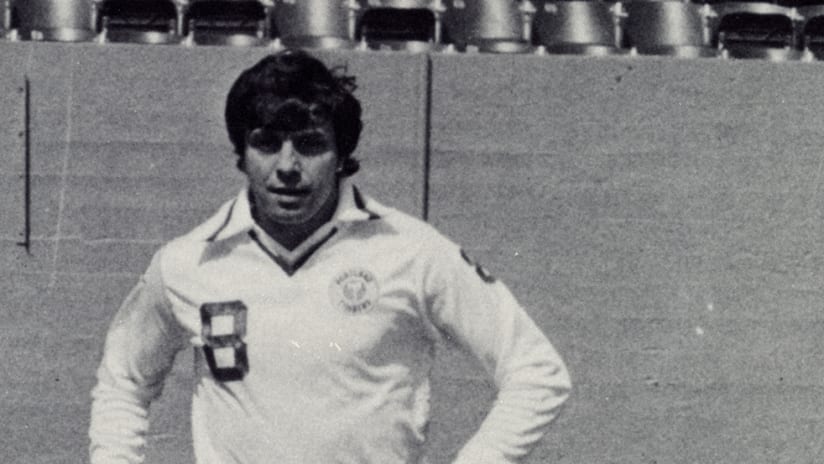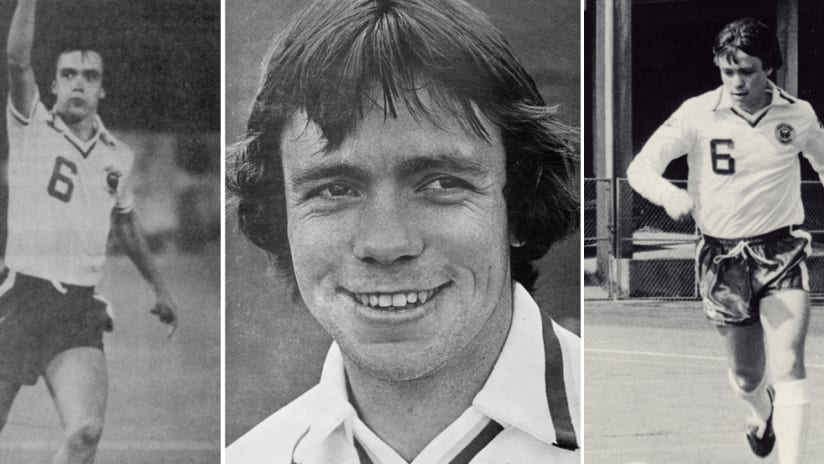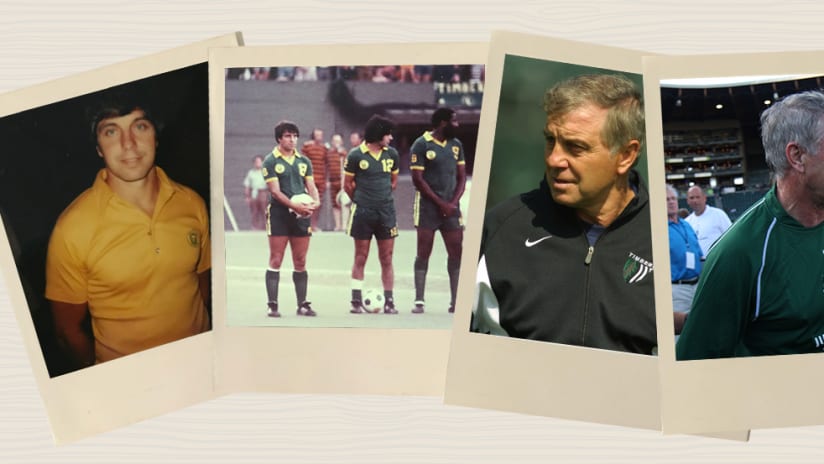Jimmy Conway’s diagnosis became public 10 years ago. Since then, Conway, one of five people commemorated in the Portland Timbers’ Ring of Honor, battled dementia, fading from his public life. One of the most important people in Oregon soccer history, Conway spent his final years in private, his legacy left to play out through teammates’ memories, the lessons of coaches he nourished, and the lives of new players he brought to the sport.
On Feb. 14, 2020, Conway passed away, succumbing to factors from his illness. He was 73 years old.
“Jimmy Conway was a Timbers legend whose influence was instrumental in the growth of soccer in Oregon,” the Portland organization said in a statement on Friday.
“He was admired and respected as a professional for the way he conducted himself at all levels, and had a true love and passion for the game.”
As soccer continues growing in Oregon and the United States, history’s most profound memories of Conway may be as the patriarch of the Oregon Youth Soccer Association, the first head coach in Oregon State University soccer history, and one of the keys to maintaining the Timbers’ influence between 1982 and 2001. But it was before that when Conway made his first mark on the Portland landscape, as a player with the Timbers from 1978 through 1982. And it was before that he made his first mark on the game itself, spending 12 years among the top levels of English soccer and collecting 20 caps for the Republic of Ireland.
“Jimmy was all soccer,” Willie Anderson, the player who featured on the opposite wing from Conway of the first Timbers team, said of his former teammate. “That was his life. That's all he talked about. That's all he thought about.”
Across those 14 years in England, Conway featured in 371 league and cup games, scoring 76 times while playing a key part of the Fulham F.C. team that reached the 1975 F.A. Cup final. The Cottagers lost that match to West Ham United, 2-0, but did so in front of a reported 100,000 people after earning their trip to Wembley Stadium.
“He would have been the equivalent to a [Designated Player] today ...,” another former teammate, Mick Hoban, said of his friend, equating the signing to a Major League Soccer player whose salary would transcend his team’s other roster limits. “Coming in at that magnitude, you never know how people are.”
That magnitude went beyond the international status he’d established for his home country. After two seasons with his first professional club, Dublin’s Bohemians F.C., Conway made the biggest move of his professional career, moving south to join Fulham. Twelve years in London saw Conway play at each of the top three levels of English soccer, with his final two seasons in England, at Manchester City F.C., spent in the first division.
Conway was 31 by the time he moved to Portland, but through the skills he brought with him to the North American Soccer League, his DP-esque reputation proved earned.
“Quick over a couple of yards, very quick over the first two or three ...,” is how Hoban described his Timber. “In five yards, [he] could beat you by two …”
“Jimmy was accurate in crossing. Tough as nuts. You didn’t want to get on the wrong side of little Jimmy because Jimmy was devilish when [you were] on the wrong side of him. And again … off the field completely different. On the field, just a nasty little bugger that you didn’t want to cross.”
He was with the team Timbers through the 1982 season, when the Timbers culminated their NASL run as an indoor team. By that time, he was also serving as one of the team’s coaches.
“We actually considered him for the head coaching position when I was going around talking to everybody …” Jim Taylor, the Timbers general manager at the turn of the century, remembered of the team’s 2001 coaching search. “At that time, Jimmy was working for Oregon Youth Soccer, and so I met with him a couple of times and just more to get his whole feeling on the Timbers and the whole process of them being born in the beginning in '75 to when they went dark, and what they could potentially be.”
By that time, Conway had made his full move into coaching, taking charge of the soccer program at Pacific University in Forest Grove in 1982. In 1988, he moved to Corvallis to take charge of the Beavers, serving as Oregon State’s head coach for eight years. When, in 2001, the Timbers returned from their dark period, he joined Bobby Howe’s staff and stayed on as an assistant until 2005.
“He could talk about it nonstop,” Timbers President of Soccer, Gavin Wilkinson, who played under Conway in Portland, said. “[He’d] talk about his previous experiences, talk about his philosophies in the game, how kids should be coached, the way to develop kids. If you wanted to listen, he would just keep talking.
“And he always had a ton of energy. We used to joke constantly when Jimmy was out there, and he took a lot of coach development and training sessions. He used to start talking and then dribble off with the ball, while he was still talking … Very rarely would he actually stand in front of everyone and put on a whiteboard session. He would be out on the field showing people what he wanted to do. That was just Jimmy.”
In 1981, he became a state coach (and eventually director of coaching) for the OYSA, beginning a tenure with the organization that lasted 28 years. Though that time would coincide with his spells at Pacific and Oregon State, and his return to the Timbers’ staff, Conway’s greatest influence on the game may have been through the organization. According to numbers from the Oregon Adult Soccer Association, his time with the OYSA and the state’s Olympic Development Program saw an estimated 24,000 players participate in teams managed by Conway, as well 1,100 coaches get licensed by U.S. Soccer through programs he organized.
“Out of everyone that I know in Oregon he has had the most impact over soccer ...,” Wilkinson said. “Just his growth of the game, the coach education, the components. Both him and Noeleen, his wife, were instrumental in growing the game in Oregon ... their whole life evolved around developing the game in the state.”
“All of us in our lives want to leave a really great footprint, and I think that’s Jimmy’s footprint in Oregon,” Noeleen Conway said. “I truly believe that. He gave of himself.
“There wasn’t maybe an evening that went by he didn’t get calls from coaches asking for information about this or that game, or how would I go about doing this and that. And he did a lot of clinics. To supplement our income he did a lot of camps. But there was never a camp that Jimmy Conway did that Jimmy wasn’t there. He was there at every single camp that had his name on it … He was a big believer in that, you put your name behind something, you show up. You’re there.”
At the first home of the Timbers’ MLS era, Conway was inducted in the team’s Ring of Honor, where his name still hangs along with those of three teammates -- Clive Charles, John Bain and Hoban -- as well as “Timber” Jim Serrill.
“It wasn’t even a decision ...,” Wilkinson said about adding Conway’s name to the group. “His and Clive’s were the first ones that said, hang on, let’s just get this done. This is not even a discussion. Because everybody knows about these guys ... it was a short conversation.”
With his passing, Conway’s name on Providence Park’s east side will be the most obvious of his legacies, but his most impactful is seen on every field in the state, coming through each new player that takes up the game. From his place an NASL Timber, to his time with OYSA, to his spells managing teams at two local colleges, to the camps and clinics he ran throughout Oregon, Conway’s legacy has already been passed on to tens of thousands; and, in the lessons those new players pass to others, there’ll be hundreds of thousands more.
“He filled a massive void,” Wilkinson said, alluding to what Oregon soccer was before Conway. Today, a different void has emerged, one that can never be filled.












